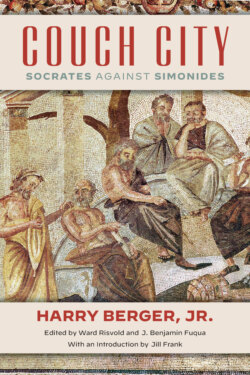Читать книгу Couch City - Harry Berger - Страница 11
На сайте Литреса книга снята с продажи.
III
ОглавлениеBerger’s provocative interpretation of the Protagoras is guided by his immensely capacious reading practice, which trains his inimitable historical, literary, and sensorial energies on the implicities and complicities of the dialogue’s language, on what he calls its “agonistic surfaces” and “mnemonic triggers.” Attending to the Protagoras’s preoccupation with face, Berger gives face to ainigma, allusion, ambivalence, ambiguity, amphiboly, and analogy (staying, in the interest of space, with the letter “a”), taking these sites of instability as prompts to shift from logic to ethics and rhetoric, and as occasions for heightened philosophic and dramatic scrutiny. Berger subjects to similar scrutiny the invalid arguments and rhetorical misfires that punctuate the Protagoras but that Socrates’s interlocutors often fail to mark.
Berger scrutinizes by, among other things, redeeming the “startle-value” of features of the Protagoras that other scholars apologize for, dismiss, or explain away. Reading “with suspicion” and “wonder,” Berger refuses to allow claims about the chronology of the dialogues or their development, or disciplinary distinctions between philosophy and rhetoric, say, or philosophy and poetry, prejudge what he sees. Marking a distinction between reading a Platonic dialogue logocentrically (as conversation to be overheard) and reading grammatologically (as a written text), and insisting on both, Berger reads with and against both the propositional logics characteristic of Anglo-American approaches to ancient philosophy and the dramatics of ascriptive intention characteristic of Straussianisms.
Zooming out to a broad range of Plato’s dialogues to round out his reading of the Protagoras, while opting at the same time for close surveillance of discursive complexities and rhetorical tropes specific to the dialogue, Berger gleefully brackets nothing. He thus avoids the misanthropy that can threaten propositional approaches when they neglect the ways in which the Protagoras mediates its characters’ speeches through the drama of the text or when they abstract moral statements from the text. He avoids, too, the misologic esotericism that can underwrite quests for veiled truths beneath or behind the text’s drama. Allying with and supplementing ongoing and emergent interdisciplinary political theoretical approaches to Plato, Berger implicates readers in the dynamics of the text, thus opening the question of when and how, between readers and texts, the bond of interlocution can become charismatic bondage.
